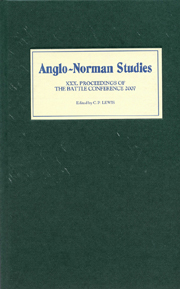Book contents
- Frontmatter
- Contents
- LIST OF ILLUSTRATIONS, MAPS, AND TABLES
- EDITOR'S PREFACE
- ABBREVIATIONS
- The Normans in Welsh History (R. Allen Brown Memorial Lecture)
- William Marshal, Lancelot, and Arthur: Chivalry and Kingship
- Grades of Ordination and Clerical Careers, c. 900–c. 1200
- Evesham J and Evesham L: Two Early Twelfth-Century Manorial Surveys
- Aspects of Church Reform in Wales, c. 1093–c. 1223
- Lay Charters and the Acta of Henry II
- Reinventing Normans as Crusaders? Ralph of Caen's Gesta Tancredi
- Kings, Lords, Charters, and the Political Culture of Twelfth-Century Wales
- Identifying the Warrior on the Pre-Heraldic Battlefield
- St Nicholas the Pilgrim and the City of Trani between Greeks and Normans, c. 1090–c. 1140
- The ‘Resurgence’ of Powys in the Late Eleventh and Early Twelfth Centuries
- Interpreter Families and Anglo-Welsh Relations in the Shropshire-Powys Marches in the Twelfth Century
- A Taste for the Antique? Henry of Blois and the Arts
EDITOR'S PREFACE
Published online by Cambridge University Press: 12 September 2012
- Frontmatter
- Contents
- LIST OF ILLUSTRATIONS, MAPS, AND TABLES
- EDITOR'S PREFACE
- ABBREVIATIONS
- The Normans in Welsh History (R. Allen Brown Memorial Lecture)
- William Marshal, Lancelot, and Arthur: Chivalry and Kingship
- Grades of Ordination and Clerical Careers, c. 900–c. 1200
- Evesham J and Evesham L: Two Early Twelfth-Century Manorial Surveys
- Aspects of Church Reform in Wales, c. 1093–c. 1223
- Lay Charters and the Acta of Henry II
- Reinventing Normans as Crusaders? Ralph of Caen's Gesta Tancredi
- Kings, Lords, Charters, and the Political Culture of Twelfth-Century Wales
- Identifying the Warrior on the Pre-Heraldic Battlefield
- St Nicholas the Pilgrim and the City of Trani between Greeks and Normans, c. 1090–c. 1140
- The ‘Resurgence’ of Powys in the Late Eleventh and Early Twelfth Centuries
- Interpreter Families and Anglo-Welsh Relations in the Shropshire-Powys Marches in the Twelfth Century
- A Taste for the Antique? Henry of Blois and the Arts
Summary
It has long been the custom of the Battle conference to leave its usual home of Pyke House every fifth year and travel abroad. Previous expeditions have been to Caen (1987), Palermo (1992), Dublin (1997), and Glasgow (2002). Since ‘abroad’ clearly means ‘outside Anglo-Norman England’, it was possible in 2007 to visit Wales, the only one of the four nations of the British Isles (or indeed the Six Nations) previously unvisited. The thirtieth Battle conference was thus held 1–6 August at Gregynog, the conference centre of the University of Wales, west of Offa's Dyke and the river Severn, in the medieval commote of Cedewain, long ruled by an independent native dynasty (though perhaps briefly under Anglo-Norman overlordship).
Holding the conference away from Battle is a reminder of quite how much work the staff of Pyke House do in preparation for our visit. This year Dr Karen Jankulak (University of Wales, Lampeter) volunteered to take bookings and liaise with Gregynog, perhaps not realizing how much was involved, and certainly not knowing that she would be made head of department in the meantime. She was properly thanked at the conclusion of the conference, but the director's relief and gratitude linger still in recalling how smoothly all the arrangements went. The staff at Gregynog were also wonderfully accommodating and helpful. Gregynog's extraordinary architecture, lovely gardens and grounds, and atmospheric bar made for a memorable conference.
- Type
- Chapter
- Information
- Anglo-Norman Studies 30Proceedings of the Battle Conference 2007, pp. vii - viiiPublisher: Boydell & BrewerPrint publication year: 2008



